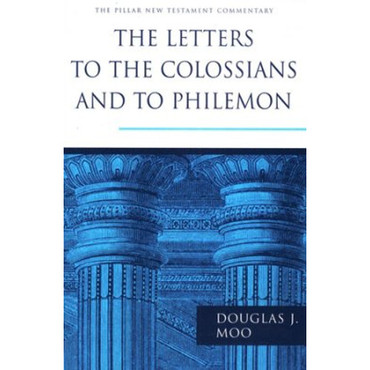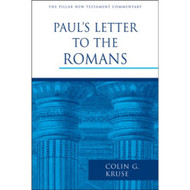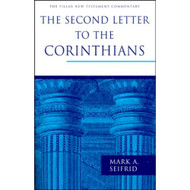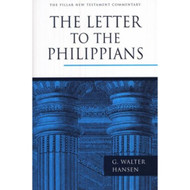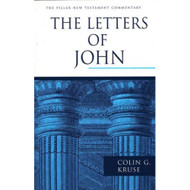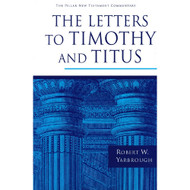Categories
Categories
The Letters to the Colossians and to Philemon (The Pillar New Testament Commentary)
The Letters to the Colossians and to Philemon (The Pillar New Testament Commentary)
Product Description
Series: The Pillar New Testament Commentary
Exhibiting the same brilliant exegesis and sound practical insight found in his previous works, noted commentator Douglas J. Moo in this new volume not only explains accurately the meaning of the letters to the Colossians and to Philemon but also applies that meaning powerfully to twenty-first-century readers. Moo both interacts with the Greek text of these letters and clearly explains the English text to a contemporary audience.
Informed, evangelical, methodologically astute, and displaying a careful balance between good scholarship and pastoral concern -- earmarks of the Pillar New Testament Commentary series as a whole -- Moo's Letters to the Colossians and to Philemon will offer insights to a wide range of readers, from teachers and students, to pastors and parishioners, to scholars and laypersons.
Endorsement
Douglas Moo's fresh commentary on Colossians does not fail to follow in the tradition of the writer's excellent and extensive work on Romans. The volume also contributes to what appears to be a very satisfying trend in the relatively new Pillar Commentary set by Eerdmans - solid conservative scholarship and excellent readability. The Wheaton Professor explains in his preface that the research for this work felt "like coming home" (x). This feeling of the writer's personal fascination and joy in study of the book overflows into its readability. Not even Bruce (see review on The Epistles to the Colossians, to Philemon, and to the Ephesians (New International Commentary on the New Testament))can match these literary qualities in the mind of this reviewer.
As to the content of the work, Moo devotes 46 pages to an introduction to Colossians, 90 pages to Colossians 1 (30 of which are dedicated to the 6 verse "Christ hymn"), 79 pages to chapter 2, 73 pages to chapter 3, 36 pages to chapter 4, and 85 pages to the Book of Philemon. A thorough index of authors, subjects, scripture, and extra-biblical literature fills the final 28 pages. For the purposes of this review, a focus will be given to the majority of the book - the commentary on Colossians.
Moo's introduction to the book leaves nothing lacking. Initially Moo surveys the recipients and moves on to tackle the question of authorship. With a skillful presentation of the opposing sides of the issue, Moo presents a set of logical criterion which each side must meet and then proceeds to demonstrate how the critical approach fails to meet each criteria and how the conservative interpretation succeeds on each point. Moo narrows his focus to what he believes to be the main criticisms of the Pauline authorship of the book: linguistic and theological. Over the next 14 pages, the writer ably defends each point. Following the discussion of authorship, the date and provenance are discussed (6 pages). The occasion of the book (the Colossian heresy) receives no less than 15 pages of thorough treatment. In the reviewer's opinion, no better analysis of the positions on the Colossian heresy exists in print. Moo discusses the difficult subject with a great deal of humility, admitting that he is "not convinced that the letter provides enough information for us to be even reasonably sure about the identification of the false teaching" (49). Moo begins by quickly passing up the minor view that the Book of Colossians deals not with a real heresy, but a theoretical doctrinal aberration (47) as well as the rapidly diminishing view of Gnosticism (53). The author gives a fair treatment of the 3 major views by weighing in with positive and negative aspects of each one (Jewish mysticism, standard Judaism, and syncretistic philosophy, respectively) before cautiously settling on the final view (58). The final 12 pages of the introduction comprise a theological analysis of the book.
The quality of the exegesis is demonstrated throughout the volume in numerous passages, but for the purposes of this review several highlights will be noted. Moo's diagram (81) and discussion of the opening prayer/thanksgiving is extensive and helpful. As noted above, the discussion of the "Christ hymn" (107-137) is nothing less than impressive. The listing of all imperatives in the book (175-176) is a helpful tool that many commentators fail to include. Also, helpful lexical metaphors are well noted throughout the text (e.g. 180). Another theme that presents itself throughout the commentary is the relationship between Ephesians and Colossians. Moo demonstrates that the relationship is fluid and points out differences in argument between the books as well as points of agreement (e.g. 231-232). The exegesis of 3:3 is of the highest caliber (250), weaving serious lexical and historical arguments into some very practical conclusions. Another aspect of the work that this reviewer particularly enjoys is that the writer is not content to simply abandon the discussion of the authorship of the book following the introduction to the book, but rather proceedes to drive the point home on various passages throughout the text (cf. 245, 333-4, 337, 344). Textual variants are treated as extensively as necessary (e.g. 259-260). The treatment of the Haustafeln (292-317) handles well some of the hermeneutical hurdles of topics such as the relationship of husbands and wives and the institution of slavery. In every section the rhetorical and literary structure is presented carefully (e.g. 318). Overall, the handling of each paragraph is filled with quality exegesis and in-depth analysis.
This analysis is no better demonstrated than by the manner in which the writer deals with the interpretational difficulties throughout the book. Moo argues against Dunn's co-authorship theory (76), holds that "all the world" (1:6) is a rhetorical rather than a historical statement (89), believes that the "spirit" of 1:8 is, in fact, the Holy Spirit (92), attaches "joy" (1:11,12) with "giving thanks" rather than "patience and longsuffering" (100), and cautiously holds to the view that Paul modified an existing Christian (114) hymn in 1:15-20 (110). The challenge of the "firstborn of all creation" is handled with ease (119-120). The writer believes that "faith" in 1:23 is a reference to "your faith" rather than "the faith" (144) and that "now" (1:24) is a transitional marker. The challenge of 1:24 is dealt with reasonably well, but the writer's position is not as clearly articulated as this reviewer would have preferred (151-153). The author argues against Wright's pun theory in 2:8 (185), holds to spiritual circumcision in 2:11 and physical baptism in 2:12 (200-202), views "dead in your sins" (2:13) as causal rather than locative (206), dismisses the various theories regarding the "handwriting" (2:14) in favor of the view of a general IOU dismissed at Christ's crucifixion (210-211), views "having stripped" (2:15) as an intensive middle instead of Wright's true middle (213), and holds that "worshipping of angels" is worship given to angels (226-227). Moo dismisses the idea that the "right hand (3:1) is an Old Testament allusion (247), views the "wrath of God" as eschatological (258-259), holds that the "bond" (3:14) is of the prior virtues rather than a bond of believers (281), sees "rule" (3:15) as both an athletic and an administrative metaphor (283), views "word of Christ" as an objective genitive, explains that the "children" of 3:20 are neither very young or of any age, but rather something of a middle ground (304), treats extensively the ethical challenge of slavery (308-310, 315), translates "serve" (3:24) as imperitive rather than indicative (313), applies 3:25 to slaves only (314), views "grace" (4:6) as either/or, both/and divine grace and human graciousness (330), argues for a literal view of the "fellow-prisoner" in 4:10 (338), and holds that the Epistle to the Laodiceans is an uninspired and unpreserved letter written from Paul to the believers at Laodicea (351).
When attempting to find negative elements of a massive tome such as this, one would initially believe that such a task would be relatively easy; however, Moo leaves the reviewer quite a challenge in this area. A handful of small challenges can be presented though. First, Moo's choice of the TNIV was not the best in the mind of the reviewer. At numerous occasions the writer finds himself defending or explaining some of the more "interpretative" elements of the translation (e.g. 345-346). The ESV would have been a much better translation for the purposes of this commentary. Second, it seems that Moo at times grants too much credibility to some of the more questionable views of the text (e.g. 123). Third, a more thorough explanation of his views in regard to circumcision and baptism could be warranted (202). Finally, some textual variants seem to get swept under the rug rather than actually wrestled with (e.g. 335-336). In perspective, these flaws are minor and they do not weigh heavily enough to influence the reviewer's high ranking of the commentary.
In light of the commentary's literary qualities, extensive treatment of the text, helpful and thorough introduction to the book, quality exegesis, and solid handling of exegetical difficulties, this reviewer would without hesitation or qualification recommend this volume as the single best exegetical commentary on the Book of Colossians - Philip Thompson
 Loading... Please wait...
Loading... Please wait... 
